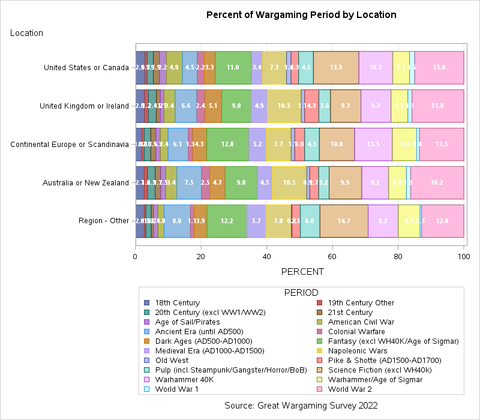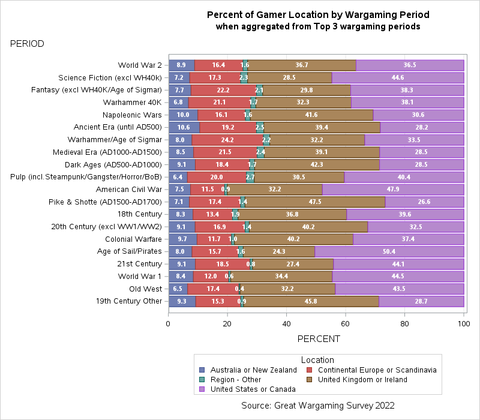GWS 2022: Location, location, location
By Jonathan Freitag
In a recent look at wargaming period preference (see: Period Preferences for Wargamers), one reader asked if gamers' location contributed to period preference. While a tendency for location to influence select preferences was noted in other analyses, the relationship between gamer’s location and wargaming period choice remained unexplored.
Should location or geographic region influence interest or demand for gaming a particular period? In today's instalment of exploring WS&S' Great Wargaming Survey results, the role of location on wargaming period preference is examined.
Periods by Location
As seen in previous analyses assessing top choices of wargaming periods, World War II gaming is the most popular. A breakdown by region (Location) shows that World War II gaming is the top wargaming period of choice across all regions (see Figure 1). Looking at the other favorite periods within each region shows that the various Fantasy/Sci-Fi periods claim the next several ranked places.
Two general observations from Figure 1 appear. These observations are:
- UK/Ireland and Australia/New Zealand tend to play more historical wargaming periods than the rest of the world.
- Wargaming preferences are very similar for UK/Ireland and Australia/New Zealand gamers.
What drives these two tendencies? Is it age related (survey data suggests age could be a contributing factor)? National characteristics? Something else?
With all of the assorted periods compressed into a very colorful graphic, it is difficult to identify any tendencies across locations within a particular period. To better visual the data from this perspective, the data needs to be turned on its head.
Locations by Period
Transposing the data to show location by period provides more insight into any differences between regions.
Figure 2 aggregates the top three wargaming period choices and ranks these periods in order of descending popularity. That is, World War II is the most chosen period and 19th Century Other is the least chosen.
Since the UK/Ireland and USA/Canada regions comprise the largest percentage of total survey responses, tendencies and generalizations will be kept to these two dominate regions for this exercise.
In a brief compare and contrast between wargaming period choices between the UK/Ireland (UK) and USA/Canada (US) what are a few of the notable take-aways from the survey?
- World War II is equally popular.
- US gamers tends to favor Fantasy/Sci-Fi periods more so than UK gamers.
- UK gamers tends to favor historical periods more so than US gamers.
- US wargamers prefer American Civil War much more than their UK counterparts.
- UK wargamers prefer Pike & Shotte much more than their US counterparts.
Is there a foundation for these reported differences and do these results hold any commercial value?
Given your own geographic region, do these generalized tendencies hold for your own wargaming preferences?



4 comments
Patrick, thank you for your comment. Pleased to see this topic is of interest to you. Unfortunately, USA and Canada are combined into one classification in the survey with no way to separate the two. Perhaps separating USA and Canada responses in 2023 survey is possible?
Niche I know but it would be interesting to see the differences between Canada and the US and UK especially when it comes to historical and non-40k games. I am biased in that many Canadian gamers I know have a UK connection within the last generation or two, and I wonder if that drives wargame preferences at all. ACW is also quite popular up here too, more so than in the UK perhaps, but Pacific war – not so much.
Great analysis as always thank you!
Hi Daniel,
Thank you for your feedback and insights.
I do not draw any conclusions in a mathematically statistical sense since the selection of participants does follow accepted statistical sampling techniques. Since response is voluntary and only readily available to those with knowledge of and access to the survey, making statistical inferences from the results is subject to self-selection bias.
What I do state are observations about the tendencies brought out in the aggregation of the survey responses. Are these tendencies unbiased? Perhaps not but having studied these data over several years, the results are consistent from year to year. Rarely do I see wild swings in the results from year to year. With sample size generally exceeding 10,000 annually, perhaps the law of large numbers and the “hive mind” offer up a collective intelligence on the state of the hobby that is not too far removed from the truth?
Looking at your graphs, I wonder if the conclusions you draw from this data might not be “statistically significant” if mathematical tests were applied. That said, anecdotally I agree: Wargamers prefer playing games that relate to their local history. In Texas, I put on many games at wargame shows. If my scenario includes the “Texan Division”, I will get three to four times the interest compared to a similar battle fought by say a New Zealand division, even if historically the Texans lost. Travel and take the same game to Louisiana or Missouri, the “American” side draws double the Kiwis, but the lack of local boys means the difference is less marked. I believe the same is even true of fantasy gaming, where including humans and/or planet earth increases the appeal.